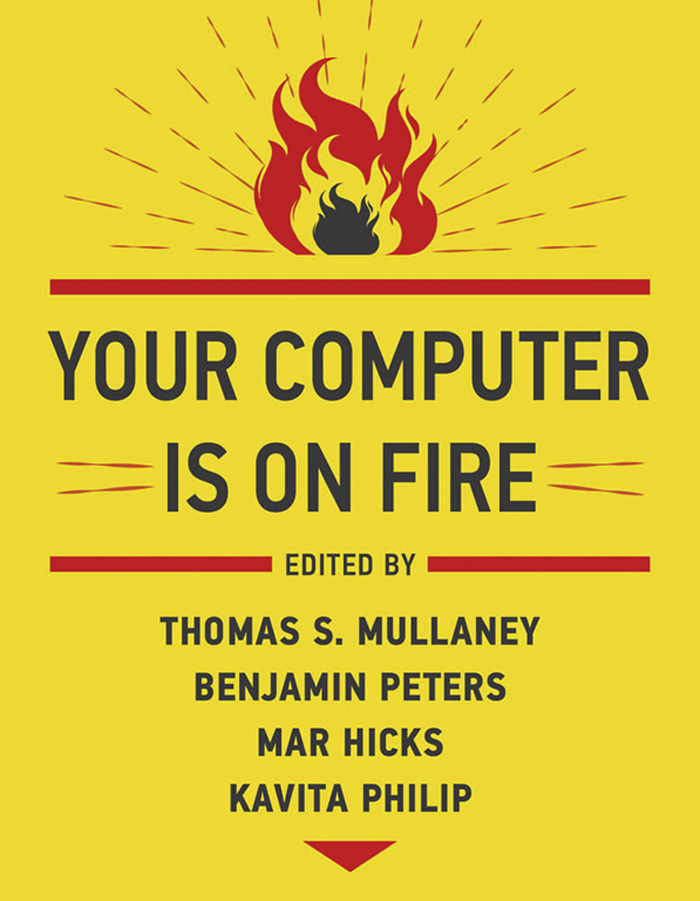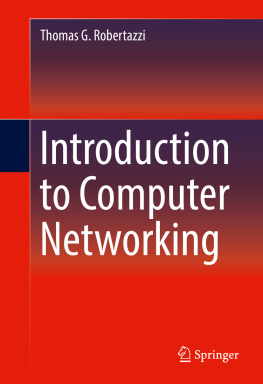Thomas S. Mullaney - Your Computer Is on Fire
Here you can read online Thomas S. Mullaney - Your Computer Is on Fire full text of the book (entire story) in english for free. Download pdf and epub, get meaning, cover and reviews about this ebook. year: 2021, publisher: MIT Press, genre: Politics. Description of the work, (preface) as well as reviews are available. Best literature library LitArk.com created for fans of good reading and offers a wide selection of genres:
Romance novel
Science fiction
Adventure
Detective
Science
History
Home and family
Prose
Art
Politics
Computer
Non-fiction
Religion
Business
Children
Humor
Choose a favorite category and find really read worthwhile books. Enjoy immersion in the world of imagination, feel the emotions of the characters or learn something new for yourself, make an fascinating discovery.

- Book:Your Computer Is on Fire
- Author:
- Publisher:MIT Press
- Genre:
- Year:2021
- Rating:5 / 5
- Favourites:Add to favourites
- Your mark:
- 100
- 1
- 2
- 3
- 4
- 5
Your Computer Is on Fire: summary, description and annotation
We offer to read an annotation, description, summary or preface (depends on what the author of the book "Your Computer Is on Fire" wrote himself). If you haven't found the necessary information about the book — write in the comments, we will try to find it.
Your Computer Is on Fire — read online for free the complete book (whole text) full work
Below is the text of the book, divided by pages. System saving the place of the last page read, allows you to conveniently read the book "Your Computer Is on Fire" online for free, without having to search again every time where you left off. Put a bookmark, and you can go to the page where you finished reading at any time.
Font size:
Interval:
Bookmark:

Edited by Thomas S. Mullaney, Benjamin Peters, Mar Hicks, and Kavita Philip
The MIT PressCambridge, MassachusettsLondon, England
2021 Massachusetts Institute of Technology
All rights reserved. No part of this book may be reproduced in any form by any electronic or mechanical means (including photocopying, recording, or information storage and retrieval) without permission in writing from the publisher.
This book was set in ITC Stone and Avenir by New Best-set Typesetters Ltd.
Library of Congress Cataloging-in-Publication Data
Names: Mullaney, Thomas S. (Thomas Shawn), editor. | Peters, Benjamin, 1980 editor. | Hicks, Mar, editor. | Philip, Kavita, 1964 editor.
Title: Your computer is on fire / edited by Thomas S. Mullaney, Benjamin Peters, Mar Hicks, Kavita Philip.
Description: Cambridge, Massachusetts : The MIT Press, [2020] | Includes bibliographical references and index.
Identifiers: LCCN 2019059152 | ISBN 9780262539739 (paperback)
Subjects: LCSH: ComputersSocial aspects. | Information technologySocial aspects.
Classification: LCC QA76.9.C66 Y67 2020 | DDC 303.48/34dc23
LC record available at https://lccn.loc.gov/2019059152
10987654321
d_r0
Thomas S. Mullaney
Mar Hicks
Nathan Ensmenger
Sarah T. Roberts
Benjamin Peters
Kavita Philip
Mitali Thakor
Mar Hicks
Corinna Schlombs
Halcyon M. Lawrence
Safiya Umoja Noble
Andrea Stanton
Noah Wardrip-Fruin
Janet Abbate
Ben Allen
Sreela Sarkar
Paul N. Edwards
Thomas S. Mullaney
Kavita Philip
Benjamin Peters
Thomas S. Mullaney
Humanists and social scientists who work on computing and new media are subject to daily reminders about how little most technologists reflect upon our work or take our scholarship under advisement. We are gadflies, it would seem, always dwelling upon the negative sides of technology rather than its unquestionable positives. We are technophobes who, either because of our failure to understand the technologies we critique, or perhaps out of envy for the power of those who build them, are akin to millenarian street preachers waving signs that read The End Is Nigh. Our critiques are made in bad faith, moreover, as we are so often spotted using in our classrooms, our essays, and our books the very systems, platforms, and devices that we lament.
The profound self-confidence and self-assurance of these same technologists are on daily display as well. Their bias toward action is considered refreshing; their predilection to move fast and break things is celebrated. Even when systems fail in spectacular fashion, a seemingly endless supply of assuring words are at the ready to defuse or deflect.
Technology firms selling bleeding-edge surveillance systems to authoritarian regimes at home and abroad?
Bad actors.
Latest-generation web cameras incapable of recognizing the faces of African-American users (yet functioning flawlessly with Caucasian users)?
Bad training data.
Rampant and historically unprecedented growth of corporate surveillance?
Terms of usage.
No matter the problem, it seems, a chorus of techno-utopian voices is always at the ready to offer up solutions that, remarkably enough, typically involve the same strategies (and personnel) as those that helped give rise to the crisis in the first place. We can always code our way out, we are assured. We can make, bootstrap, and science the shit out of this.
A largely unreflective rush to automating immense sectors of the labor economy out of existence?
Creative destruction.
Widely documented gender, class, and ethnoracial inequalities across the IT labor force?
A pipeline problem.
Camera blink detection technology repeatedly flagging users of Asian descent with the prompt Did Someone Blink?
A bug, not a feature.
Googles image-recognition algorithm tagging the faces of African-American individuals with the word gorillas?
They fixed it in the next release.
From the standpoint of technologists, the appeal of this argument is not hard to understand. If one believes in it, after all, then one also believes that technologists should continue to enjoy a monopoly, not only over the first-order creation of an ever-increasing number of computationally grounded political, social, cultural, and economic frameworks, but also over the second-order repair and replacement of said systems when they (repeatedly) fall short or break down. Who would want to relinquish such a plum position?
The contributors to this volumescholars who approach computing and new media from a variety of critical perspectives derived from humanistic, social scientific, and STEM disciplineshave come together to issue a manifesto that can be summarized as follows:
Your computer is on fire.
Humankind can no longer afford to be lulled into complacency by narratives of techno-utopianism or technoneutrality, or by self-assured and oversimplified evasion. Every time we hear the call of a lullabysoothing words such as human error, virtual reality, the Cloud, or others meant to coax us back to sleep, leaving the adults to continue drivingour response should be a warning siren, alarming us and those around us into a state of alertness and vigilance. Every established or emerging norm needs to be interrogatedwhether the taken-for-granted whiteness of humanoid robots, the ostensibly accentless normative speech of virtual assistants, the near invisibility of the human labor that makes so many of the ostensibly automated systems possible, the hegemonic position enjoyed by the English language and the Latin alphabet within modern information-processing systems, the widespread deployment of algorithmic policing, the erosion of publicly governed infrastructures at the hands of private (and ultimately ephemeral) mobile platforms, the increasing flirtation with (if not implementation of) autonomous weapons systems capable of selecting and engaging targets independently, and the list goes on. The long-standing dismissal or evasion of humanistic and social scientific critiques of computing and new media is over. It has to be over, because to allow it to continue is simply too dangerous.
When we speak of fire in this volume, we do so in three interconnected ways. Our first usage is literal. Despite widespread tropes that portray computing and new media as immaterial and disembodiedwhether through an emphasis on virtual reality, telepresence, the Cloud, streaming, the postindustrial economy, or otherwisecomputing and new media are nothing if not entirely physical, material, and organic. They are physical machines, propelled by fire both material and metabolic. When they run, they run hot; and when they work hard, they run hotter. Data centers alone account for more than 2 percent of global energy use, energy consumption predicted to grow with the expansion of the Internet of Things. (Google emitted over 50 kilograms of CO2 in the time it took for you to read this sentence.) Through the studies of platforms and infrastructure, bitcoin mining, programming languages, underground cable networks, and much more, this volume drives home what is often termed the materiality of the digitalthat is, the physicality of computational and new media technologies that are too often described in ethereal terms.
Computing and new media depend upon flesh-and-bone metabolism. Our virtual worlds are made possible by battalions of human beings (as well as nonhuman organisms): cable layers, miners, e-waste recyclers, content moderators, call-center operators, data-entry technicians, and repair technicians, many of whom come from marginalized class, racial, and gendered positions. Computing and new media run on a vast metabolic conflagration. In certain cases, the work of fabricating so-called virtual experiences exposes laborers to a daily regimen of toxic by-products of electronics manufacturing and disposal and, in other cases, to forms of post-traumatic stress disorder (PTSD) that grow out of long working days spent concentrating on realms of the digital world that the rest of us rely upon them to keep out of view: still-frame and live-action portrayals of extreme violence, child pornography, and vicious or hateful speech.
Next pageFont size:
Interval:
Bookmark:
Similar books «Your Computer Is on Fire»
Look at similar books to Your Computer Is on Fire. We have selected literature similar in name and meaning in the hope of providing readers with more options to find new, interesting, not yet read works.
Discussion, reviews of the book Your Computer Is on Fire and just readers' own opinions. Leave your comments, write what you think about the work, its meaning or the main characters. Specify what exactly you liked and what you didn't like, and why you think so.








